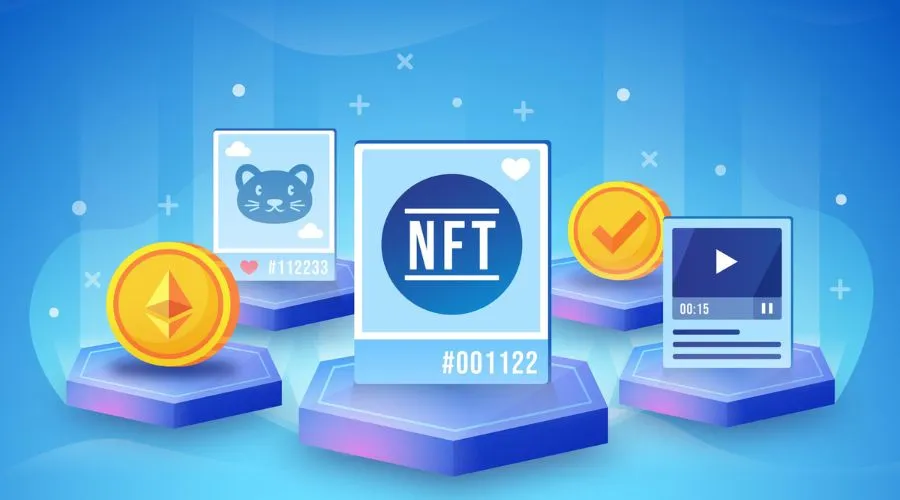The world of Non-Fungible Tokens (NFTs) is experiencing rapid expansion, and it’s expected to continue growing in the years to come. As a result, establishing an NFT marketplace can be a game-changing move, especially given the number of top NFT markets that already exist and boast a sizable user base. In this context, opting for White Label NFT marketplace solutions can prove to be a wise choice.
There are several advantages to utilizing a White Label NFT Marketplace solution. It’s the ideal solution for empowering traders, offering a customizable NFT marketplace that can be tailored to your specific needs. For entrepreneurs eager to enter the booming NFT market swiftly, it provides the perfect combination.
This article explores the advantages and strategies of developing a White Label NFT Marketplace in 2024 and presents a list of the top 10 White Label NFT Marketplaces for the year.
Why There Is A Need To Consider White-Label NFT Marketplaces?
The NFT ecosystem is teeming with opportunities, but entering this market can be challenging. Two primary methods can be employed to create a top NFT marketplace: building from scratch or using a White Label NFT marketplace development service. Developing a marketplace from the ground up demands a significant amount of time, effort, and resources. In contrast, White Label NFT marketplace solutions provide a practical and cost-effective means to establish a top NFT marketplace quickly.
Here are some key reasons why a White Label NFT Marketplace is worth considering:
Quick Launch
These solutions allow for the rapid development and deployment of an NFT marketplace, enabling a swift entry into the market.
Affordability
Offering a cost-effective alternative to building a marketplace from scratch, saving both time and money.
Customization
White Label NFT marketplace development allows business owners to tailor the platform to their specific requirements. This flexibility is one of the primary advantages that attracts investors and entrepreneurs.
Support for Different Blockchains
White Label NFT marketplaces often support various blockchain networks, including Polygon, Binance Smart Chain, Solana, and more. This ensures compatibility with a wide range of NFT assets.
The Process Of A White Label NFT Marketplace Development
Creating a White Label NFT Marketplace involves a structured development process. It’s essential to plan ahead and carefully consider the features you need. The development process typically includes the following stages:
UI Development
Designing the user interface (UI) is the initial phase of White Label NFT marketplace development. During this stage, you’ll determine which blockchain technology to use and create an intuitive and visually appealing platform that highlights its advantages.
Smart Contract Development
The second stage involves creating smart contracts. NFTs are built on decentralized principles, with no central authority. Smart contracts ensure secure and transparent transactions, adhering to the principles of decentralization.
Storage Setup
Setting up the database is the third step, where transactional data and user information are securely stored in one location. Additionally, the NFT assets listed on the platform are stored. This process ensures data security and often includes the use of IPFS (InterPlanetary File System) to store NFTs.
Backend And Frontend Integration
The fourth stage involves integrating the frontend and backend of the platform. Developers integrate the user interface with the backend features, allowing users to interact seamlessly with the NFT marketplace.
Testnet
Testing is a critical step in White Label NFT marketplace development. The platform is tested on a testnet to identify and resolve any issues. This iterative process continues until the platform functions flawlessly.
Deployment
After rigorous testing, the final step is deploying the marketplace on a client-server. This makes the White Label NFT marketplace accessible to users worldwide via the mainnet.
Features Of White Label NFT Platforms That Set Them Apart
White Label NFT marketplaces offer several unique features that distinguish them from traditional marketplaces:
Affordability
Creating a marketplace from scratch can be costly, while White Label solutions provide a more budget-friendly option, saving both time and money.
Auction Capabilities
White Label NFT marketplaces often offer advanced auction features, attracting a large user base interested in buying, selling, and bidding on NFTs.
Customization
Users can tailor the platform to their specific business requirements, enhancing the user experience and platform functionality.
Enhanced Security
White Label NFT marketplaces prioritize security, protecting user data through robust encryption measures.
User-Friendly Dashboard
The platform typically features a multi-functional admin and user dashboard, making it easy for users to access information and track their transaction history.
Comprehensive Features
White Label NFT marketplaces come with built-in features and capabilities, making it easy to launch and operate the platform efficiently.
2024’s Top White Label NFT Marketplaces
Now, let’s take a closer look at the top White Label NFT marketplaces for 2024:
OpenSea Clone
Built on Ethereum blockchain technology, OpenSea Clone was one of the first NFT platforms. It boasts a billion-dollar revenue and has been a significant player in the crypto industry since 2017.
Rarible Clone
This White Label NFT marketplace, created on the Ethereum network, allows users to create various types of NFTs. It offers a flexible platform for integrating cryptocurrency and accessing a secure NFT marketplace.
Foundation Clone
Foundation Clone supports the exchange of digital assets from various domains. Its key features include an attractive shop, advanced search filters, multi-wallet integration, and more.
Enjin Clone
Enjin Clone enables the creation and integration of NFTs into games, apps, and websites. It operates on the Ethereum network and offers cross-chain compatibility and a secure built-in wallet.
Solanart Clone
Created on the Solana blockchain, Solonart Clone provides an ideal platform for artists to showcase their work. It serves a similar purpose to the Solonart NFT marketplace.
Solsea Clone
Solsea Clone, based on the Solana blockchain, offers Solsea-like features and capabilities. It allows users to apply copyright licenses to NFTs and provides a user-friendly platform for trading various digital collectibles.
SuperRare Clone
SuperRare Clone is a decentralized marketplace powered by smart contracts, designed for trading tokenized digital artworks. It enforces strict rules to maintain the exclusivity and traceability of listed works.
NBA Top Shot Clone
NBA Top Shot Clone caters to sports enthusiasts and NFT supporters, providing a platform to trade digital sports memorabilia and memorabilia based on sports.
Binance NFT Marketplace Clone
This white label alternative to the Binance NFT marketplace offers customizable blockchain technology and strong security features, including support for mystery boxes and secure NFT trading.
Nifty Gateway Clone
Nifty Gateway Clone is an exclusive marketplace for NFT art auctions. It features premium digital collectibles, known as “Nifties,” and provides features like wallet integration, asset categorization, and more.
Benefits of White Label NFT Marketplace Platforms
White Label NFT marketplace platforms offer several advantages, including:
Access to Relevant Data
Users can access comprehensive data, enhancing their trading experience and providing valuable insights.
Rigorous Testing
Extensive testing before going live ensures a robust and bug-free platform, guaranteeing a smooth user experience.
Wallet Integration
Wallet integration simplifies the user experience and saves time, allowing users to transact directly from the platform.
How To Monetize White Label NFT Platform?
White Label NFT platforms offer multiple monetization opportunities, including:
Commission Fees
Charging a commission on sales and purchases of NFTs on your platform can generate significant revenue.
Listing Fees
Charging a fee for minting NFTs in your marketplace is a common monetization strategy.
Marketing Opportunities
Offering custom marketing spaces to businesses for advertising can provide an additional income stream.
Auction Fees
Earning fees from auctioning NFTs on the platform can be a profitable monetization method.
Choosing the Best White Label NFT Marketplace
Selecting the best White Label NFT marketplace involves considering your niche and blockchain technology preferences. Evaluate the specific features and blockchain networks that align with your business goals to ensure a successful entry into the NFT market.
Developing a White Label NFT Marketplace in 2024 presents a strategic opportunity to enter the thriving world of NFTs. White Label solutions offer advantages such as cost-efficiency, customization, and integration with prominent blockchain networks, making them a compelling choice for entrepreneurs. By understanding the development process, key features, top marketplaces, and monetization options, you can make informed decisions and leverage the potential of the NFT market.
The NFT landscape is evolving rapidly, and entering this space with a White Label NFT marketplace can offer an effective and cost-efficient route to success in 2024.





